- Kenmore refrigerator water filters
- Whirlpool refrigerator water filters
- Samsung refrigerator water filters
- GE refrigerator water filters
- LG refrigerator water filters
- Frigidaire refrigerator water filters
- KitchenAid refrigerator water filters
- Maytag refrigerator water filters
- Kenmore Elite refrigerator water filters
- Estate refrigerator water filters
- GE Profile refrigerator water filters
- Amana refrigerator water filters
- Bosch refrigerator water filters
- Dacor refrigerator water filters
- Electrolux refrigerator water filters
Band Saw: Why does my band saw make ragged cuts?
Using a dull blade or the wrong type of blade in a band saw produces ragged cuts, as does feeding the work piece through the cutting area too quickly. The blade also can't make clean cuts if blade tension is loose.
Move the work piece slowly through the cutting area to help the blade cut smoothly. Pushing the work piece too fast can cause the blade to twist-resulting in cuts with tattered edges. If you have to push the work piece with more than just light force to move it through the cutting area, make sure the blade is sharp. Replace a dull blade because it will produce ragged cuts and won't cut the work piece efficiently.
Check blade tension if tattered edges appear on cuts when moving the work piece through the cutting area slowly and with light tension. Tighten blade tension if you can easily push the blade in more than a 1/4-inch using a gloved finger.
Using the wrong type of blade on a work piece can cause ragged cuts, so use the right type of blade for the work piece you're cutting. For example, using a 6 TPI (Teeth Per Inch) saw blade to cut thin plywood veneer will typically result in cuts with ragged edges. Use a thin-kerf blade with at least 60 TPI to cut thin plywood veneer cleanly.

THESE REPAIRS MAY HELP SOLVE YOUR BAND SAW PROBLEM
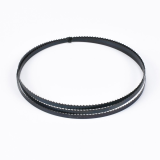
Replace the band saw blade
The band saw blade becomes dull with use. Cutting hard wood or metal hastens blade dulling. The band saw blade is dull when you must apply significantly more than normal force to push the piece you're cutting through the blade. Replace the band saw blade when it's dull or damaged.
Band saw blade
Find the required part specific to your product.
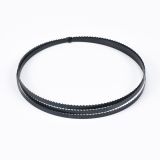
How to replace a band saw blade
If your band saw takes a long time to cut, the blade could be dull. This DIY repair guide and video show how to replace a band saw blade in 30 minutes or less.
Repair difficulty
Time required
15 minutes or less
Symptoms for band saws
Choose a symptom to see related band saw repairs.
Main causes: damaged rubber tire, worn wheel bearings, loose blade tension, dull saw blade…
Main causes: dull blade, improper feeding, loose blade tension, not using a work piece guide…
Main causes: dull blade, using the wrong type of blade, feeding work piece to quickly, loose blade tension…
Main causes: broken saw blade, bad drive belt, damaged rubber tire…
Main causes: angle indicator needs adjustment, dull blade…
Main causes: dull blade, using the wrong type of blade, weak drive motor…
Main causes: lack of electrical power, broken power cord, bad on/off switch, faulty drive motor…
Repair guides for band saws
These step-by-step repair guides will help you safely fix what’s broken on your band saw.
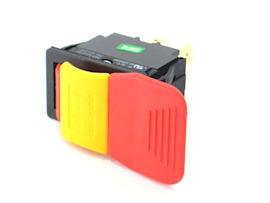
How to replace a band saw on-off switch
If the switch won't turn the band saw on or off, it could be defective. Replace the switch, using these steps.…
Repair difficulty
Time required
15 minutes or less
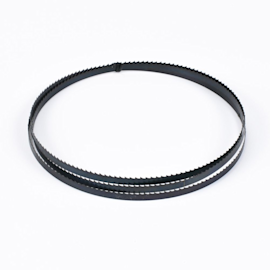
How to replace a band saw blade
If the saw blade is dull or damaged and isn't cutting cleanly, replace the blade following these steps.…
Repair difficulty
Time required
15 minutes or less
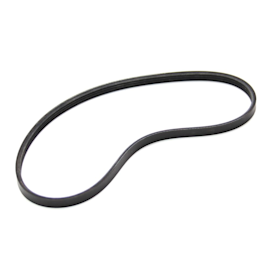
How to replace a band saw drive belt
If the motor runs but the blade doesn't move, it could be that the drive belt is broken. Here's how to replace it.…
Repair difficulty
Time required
15 minutes or less
Articles and videos for band saws
Use the advice and tips in these articles and videos to get the most out of your band saw.

Get answers to frequently asked questions about Sears and Sears PartsDirect.…
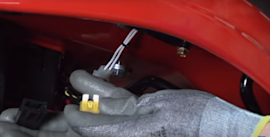
Learn how to tell whether a fuse is blown…
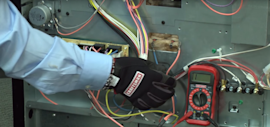
Learn how to use a multimeter to check for wiring problems in an appliance that's not working…